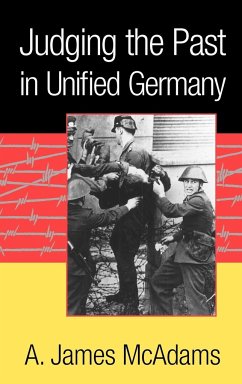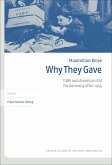A. James Mcadams
Judging the Past in Unified Germany
A. James Mcadams
Judging the Past in Unified Germany
- Gebundenes Buch
- Merkliste
- Auf die Merkliste
- Bewerten Bewerten
- Teilen
- Produkt teilen
- Produkterinnerung
- Produkterinnerung
Examines how government of unified Germany has dealt with former government of Communist East Germany.
Andere Kunden interessierten sich auch für
![Why They Gave Why They Gave]() Maximilian KloseWhy They Gave59,00 €
Maximilian KloseWhy They Gave59,00 €![Germany and the Baltic Problem After the Cold War Germany and the Baltic Problem After the Cold War]() Kristina Spohr ReadmanGermany and the Baltic Problem After the Cold War46,99 €
Kristina Spohr ReadmanGermany and the Baltic Problem After the Cold War46,99 €![The Socialist Response to Antisemitism in Imperial Germany The Socialist Response to Antisemitism in Imperial Germany]() Lars FischerThe Socialist Response to Antisemitism in Imperial Germany103,99 €
Lars FischerThe Socialist Response to Antisemitism in Imperial Germany103,99 €![The Austro-Prussian War The Austro-Prussian War]() Geoffrey WawroThe Austro-Prussian War115,99 €
Geoffrey WawroThe Austro-Prussian War115,99 €![Language and History in the Early Germanic World Language and History in the Early Germanic World]() Dennis Howard GreenLanguage and History in the Early Germanic World151,99 €
Dennis Howard GreenLanguage and History in the Early Germanic World151,99 €![In and Out of the Ghetto In and Out of the Ghetto]() R. Po-Chia HsiaIn and Out of the Ghetto163,99 €
R. Po-Chia HsiaIn and Out of the Ghetto163,99 €![The Guest Worker Question in Postwar Germany The Guest Worker Question in Postwar Germany]() Rita ChinThe Guest Worker Question in Postwar Germany90,99 €
Rita ChinThe Guest Worker Question in Postwar Germany90,99 €-
-
-
Examines how government of unified Germany has dealt with former government of Communist East Germany.
Hinweis: Dieser Artikel kann nur an eine deutsche Lieferadresse ausgeliefert werden.
Hinweis: Dieser Artikel kann nur an eine deutsche Lieferadresse ausgeliefert werden.
Produktdetails
- Produktdetails
- Verlag: Cambridge University Press
- Seitenzahl: 274
- Erscheinungstermin: 27. Mai 2011
- Englisch
- Abmessung: 235mm x 157mm x 21mm
- Gewicht: 600g
- ISBN-13: 9780521802086
- ISBN-10: 0521802083
- Artikelnr.: 22191047
- Herstellerkennzeichnung
- Libri GmbH
- Europaallee 1
- 36244 Bad Hersfeld
- gpsr@libri.de
- Verlag: Cambridge University Press
- Seitenzahl: 274
- Erscheinungstermin: 27. Mai 2011
- Englisch
- Abmessung: 235mm x 157mm x 21mm
- Gewicht: 600g
- ISBN-13: 9780521802086
- ISBN-10: 0521802083
- Artikelnr.: 22191047
- Herstellerkennzeichnung
- Libri GmbH
- Europaallee 1
- 36244 Bad Hersfeld
- gpsr@libri.de
Preface
Glossary
Note
Part I. Introduction on Judging the East German Past: 1. Interpreting East Germany's history
2. Four types of retrospective justice
Part II. Criminal Justice: Prosecuting GDR Officials: 3. Competing arguments for justice
4. Seeking justice within the law
5. A 'trial of the century'
6. Judicial architects of German unity
7. The risks of going too far
8. An ambiguous message about culpability
Part III. Disqualifying Justice: Searching for Stasi Collaborators: 9. Contending views on the Stasi's reach
10. Level one: distilling truth from the files
11. Level two: screening for Stasi activity
12. Level three: appealing dismissals before the courts
13. The competing messages of screening
Part IV. Moral Justice: Assessing the Complete Record of Dictatorship: 14. Finding fault with the churches
15. A different stand on the Deutschlandpolitik
16. Mixed emotions about the silent majority
17. Revisiting East Germany's difficult past
18. A better commission?
Part V. Corrective Justice: Returning Private Property: 19. The narrow choices behind the property settlement
20. The challenge of implementing the property statute
21. The legitimacy of Jewish claims ...
22. ... But the irreversibility of Soviet expropriations
23. Vying responses to GDR-era injustice
24. The ambiguities of drawing the line: an enduring burden of multiple pasts
Part VI. Conclusion: A Manageable Past?: 25. The FRG's constrained options
26. Judging the past in the right way
27. GDR wrongdoing in perspective
28. Contending venues of justice.
Glossary
Note
Part I. Introduction on Judging the East German Past: 1. Interpreting East Germany's history
2. Four types of retrospective justice
Part II. Criminal Justice: Prosecuting GDR Officials: 3. Competing arguments for justice
4. Seeking justice within the law
5. A 'trial of the century'
6. Judicial architects of German unity
7. The risks of going too far
8. An ambiguous message about culpability
Part III. Disqualifying Justice: Searching for Stasi Collaborators: 9. Contending views on the Stasi's reach
10. Level one: distilling truth from the files
11. Level two: screening for Stasi activity
12. Level three: appealing dismissals before the courts
13. The competing messages of screening
Part IV. Moral Justice: Assessing the Complete Record of Dictatorship: 14. Finding fault with the churches
15. A different stand on the Deutschlandpolitik
16. Mixed emotions about the silent majority
17. Revisiting East Germany's difficult past
18. A better commission?
Part V. Corrective Justice: Returning Private Property: 19. The narrow choices behind the property settlement
20. The challenge of implementing the property statute
21. The legitimacy of Jewish claims ...
22. ... But the irreversibility of Soviet expropriations
23. Vying responses to GDR-era injustice
24. The ambiguities of drawing the line: an enduring burden of multiple pasts
Part VI. Conclusion: A Manageable Past?: 25. The FRG's constrained options
26. Judging the past in the right way
27. GDR wrongdoing in perspective
28. Contending venues of justice.
Preface
Glossary
Note
Part I. Introduction on Judging the East German Past: 1. Interpreting East Germany's history
2. Four types of retrospective justice
Part II. Criminal Justice: Prosecuting GDR Officials: 3. Competing arguments for justice
4. Seeking justice within the law
5. A 'trial of the century'
6. Judicial architects of German unity
7. The risks of going too far
8. An ambiguous message about culpability
Part III. Disqualifying Justice: Searching for Stasi Collaborators: 9. Contending views on the Stasi's reach
10. Level one: distilling truth from the files
11. Level two: screening for Stasi activity
12. Level three: appealing dismissals before the courts
13. The competing messages of screening
Part IV. Moral Justice: Assessing the Complete Record of Dictatorship: 14. Finding fault with the churches
15. A different stand on the Deutschlandpolitik
16. Mixed emotions about the silent majority
17. Revisiting East Germany's difficult past
18. A better commission?
Part V. Corrective Justice: Returning Private Property: 19. The narrow choices behind the property settlement
20. The challenge of implementing the property statute
21. The legitimacy of Jewish claims ...
22. ... But the irreversibility of Soviet expropriations
23. Vying responses to GDR-era injustice
24. The ambiguities of drawing the line: an enduring burden of multiple pasts
Part VI. Conclusion: A Manageable Past?: 25. The FRG's constrained options
26. Judging the past in the right way
27. GDR wrongdoing in perspective
28. Contending venues of justice.
Glossary
Note
Part I. Introduction on Judging the East German Past: 1. Interpreting East Germany's history
2. Four types of retrospective justice
Part II. Criminal Justice: Prosecuting GDR Officials: 3. Competing arguments for justice
4. Seeking justice within the law
5. A 'trial of the century'
6. Judicial architects of German unity
7. The risks of going too far
8. An ambiguous message about culpability
Part III. Disqualifying Justice: Searching for Stasi Collaborators: 9. Contending views on the Stasi's reach
10. Level one: distilling truth from the files
11. Level two: screening for Stasi activity
12. Level three: appealing dismissals before the courts
13. The competing messages of screening
Part IV. Moral Justice: Assessing the Complete Record of Dictatorship: 14. Finding fault with the churches
15. A different stand on the Deutschlandpolitik
16. Mixed emotions about the silent majority
17. Revisiting East Germany's difficult past
18. A better commission?
Part V. Corrective Justice: Returning Private Property: 19. The narrow choices behind the property settlement
20. The challenge of implementing the property statute
21. The legitimacy of Jewish claims ...
22. ... But the irreversibility of Soviet expropriations
23. Vying responses to GDR-era injustice
24. The ambiguities of drawing the line: an enduring burden of multiple pasts
Part VI. Conclusion: A Manageable Past?: 25. The FRG's constrained options
26. Judging the past in the right way
27. GDR wrongdoing in perspective
28. Contending venues of justice.








